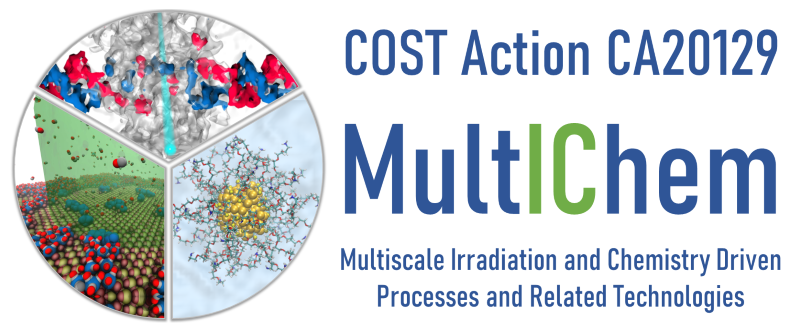Tuesday, March 28
| 09:30 - 09:45 | Training School opening |
| 09:45 - 11:00 | Basics of MBN Explorer and MBN Studio and areas of application Short description of main features of MBN Explorer and MBN Studio: universality, tunable force fields, multiscale approach, computational efficiency, etc. Areas of application of MBN Explorer and MBN Studio |
| 11:00 - 11:30 | Coffee break |
| 11:30 - 13:00 | Setting up the calculations with MBN Explorer Specification of input files and formats, and instructions on how to run the program Introduction to MBN Studio Overview of main features of MBN Studio. Trial case studies representing certain physical experiments and demonstrating capacities of the program |
| 13:00 - 14:30 | Lunch |
| 14:30 - 16:00 | Crystals, liquids, gases, plasmas Description of setting up simulations of gaseous, liquid and crystalline media with MBN Explorer. Different types of boundary conditions. Energy, temperature and pressure control in MBN Explorer |
| 16:00 - 16:30 | Coffee break |
| 16:30 - 18:00 | Atomic and molecular clusters, nanoparticles Construction of clusters and nanoparticles with MBN Studio. Description of setting up calculations involving atomic clusters and nanoparticles |
Wednesday, March 29
| 09:30 - 11:00 | Biomolecular systems Exploration of dynamical processes with biomolecular systems using MBN Explorer. Use of the CHARMM molecular mechanics potential for setting up calculations of biomolecular systems. Reactive CHARMM (rCHARMM) potential and its application for the simulation of bond breakage processes in biomolecular systems |
| 11:00 - 11:30 | Coffee break |
| 11:30 - 13:00 | Reactive Molecular Dynamics Introduction to the key principles of reactive molecular dynamics (RMD) and related case studies. RMD simulations of collision-induced processes (fragmentation and association) involving clusters, nanoparticles, as well as organic and inorganic molecular systems and materials |
| 13:00 - 14:30 | Lunch |
| 14:30 - 16:00 | Irradiation-Driven Molecular Dynamics Introduction to the key principles of irradiation-driven molecular dynamics (IDMD) and related case studies |
| 16:00 - 16:30 | Coffee break |
| 16:30 - 18:00 | Materials and interfaces (pt. 1) Computational design and investigation of structural and mechanical properties of materials (crystalline, amorphous, nanostructured) and their interfaces. Atomistic modeling of metallic, organic and inorganic nanomaterials and thin films. MD simulations of elastic and plastic deformations of materials |
Thursday, March 30
| 09:30 - 11:00 | Materials and interfaces (pt. 2) Computational design and investigation of structural and mechanical properties of materials (crystalline, amorphous, nanostructured) and their interfaces. Atomistic modeling of metallic, organic and inorganic nanomaterials and thin films. MD simulations of elastic and plastic deformations of materials |
| 11:00 - 11:30 | Coffee break |
| 11:30 - 13:00 | Thermomechanical properties of materials Investigation of thermomechanical properties as well as phase and structural transitions of crystalline and nanostructured materials by means of MD simulations |
| 13:00 - 14:30 | Lunch |
| 14:30 - 16:00 |
Multiscale modeling using stochastic dynamics Application of the stochastic dynamics method for simulations of fractal structures growth and their post-growth relaxation |
| 16:00 - 16:30 | Coffee break |
| 16:30 - 18:00 |
Relativistic dynamics of particles propagating through medium Introduction to the key principles of relativistic molecular dynamics (RelMD). RelMD simulations of propagation of particles in various media, including linear and bent crystals, heterocrystalline structures, and amorphous materials |
| 18:00 - 18:15 | Training School closing |
